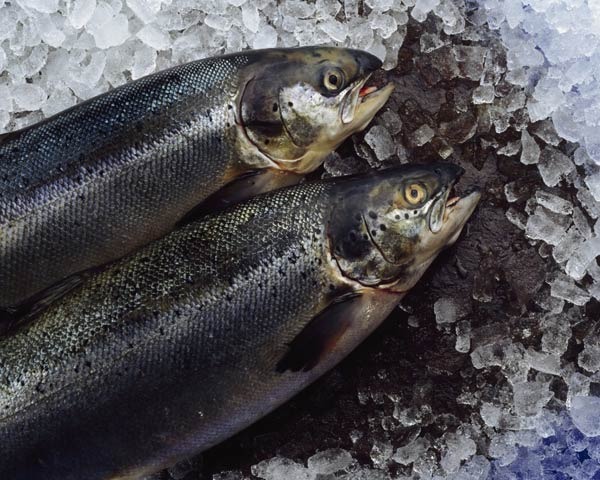Irish Salmon Farm Controversy Roils The Waters Of Galway Bay
A proposal by the Irish government to establish an 1,127-acre organic salmon farm off Inisheer (Inis Oirr in Irish), a tiny island in Galway Bay on Ireland's western coast, has met furious opposition from environmental activists, fishermen, and other concerned citizens in the area. A decision on whether or not to go ahead with the project is due soon, perhaps as early as next week.
Salmon is something the Irish feel passionate about. It isn't just a fish in Ireland, it's part of the culture — and even a symbol of wisdom and knowledge. The early 20th-century Dublin-born novelist and poet James Stephens described the mythical "Salmon who lies in the pool of Glyn Cagny" as "the most profound of living creatures," and the River Boyne was said to have been the home of the Salmon of Knowledge, who drew his intelligence from eating magical hazelnuts that had dropped into the water. After accidentally tasting the flesh of this wondrous fish, a young poet named Demne went forth into the world to become the great Irish hero Fionn Mac Cumhaill, or Finn McCool.
In more prosaic terms, salmon has long been an important and highly regarded food source in Ireland. The old Gaelic chieftains served salmon roasted whole on a spit, basted with butter, honey, and herbs, at their important banquets, and in some parts of the country it was traditional to have a whole salmon as the centerpiece of a Christmas dinner, in place of goose or turkey. And of course Irish smoked salmon is widely considered to be the best in the world.
Besides being proud of their salmon, the Irish have long bragged (justifiably) about the quality and variety of the seafood caught off the country's lengthy coastline and about the purity of the waters in which that seafood swims. In particular, the people of Inisheer and the other two Aran Islands, Inishmore (Inis Mór) and Inishmaan (Inis Meáin), who depend largely on tourism and fishing for their livelihoods, were not happy when Ireland's Bord Iascaigh Mhara (BIM), or Sea Fisheries Board, which oversees the country's seafood industry, announced the impending construction of the salmon farm about a mile off Inisheer's coast. The facility, which would be government-owned but run by a private company whose identity has not yet been announced, would produce an estimated 15,000 tons of fish annually — translating to a little more than 3.5 million salmon worth roughly €100 million (around $130 million) on the export market — and, claims BIM, would supply jobs directly to about 350 locals by its fourth year of operation, and would account for the employment of about 150 more in supporting businesses. (The average number of employees for a farm like the one proposed, counter local seafood experts, would be more like 100 than 500, and the farm would probably displace at least that many jobs in the tourism business.)
Residents of the Aran Islands and of the Galway area in general have vigorously protested plans for the farm. They're concerned about pollution, to begin with. They fear that waste materials and drugs used to keep the farmed fish free from sea lice and infectious salmon anemia will leak into surrounding waters and even wash ashore, possibly polluting the land as well and scaring tourists from local beaches. A local fishery official, Christopher Egan, has also pointed out that the food pellets the fish will eat contain a colorant to artificially give their flesh the dark pink "salmony" hue consumers expect, and that wild fish in the area are likely to identify these pellets as "free food" and eat them, too — with the result that cod and other white fish that are important to the local economy may start turning up considerably less than white. Other concerned citizens maintain that even the very site of the salmon cages floating in Galway Bay will turn away potential visitors to the region.
My friend Enda Conneely, a fisherman and conservationist who runs the small Island Cottage café and bed-and-breakfast on Inisheer with his wife, Marie, is one of the more vocal foes of the project. "They're going to license operation of the farm to multinationals, essentially Norwegians, and they're going to want to build nine more farms of the same size around here if they want to compete with Scotland and Norway in the international marketplace, which of course they will. Salmon is a noble beast, and they're actually manipulating all the myths about it and coming up with all this horrible things. I happen to think that you should eat proper food if you can, and that you shouldn't be destroying the environment just because the Chinese want to eat salmon."
